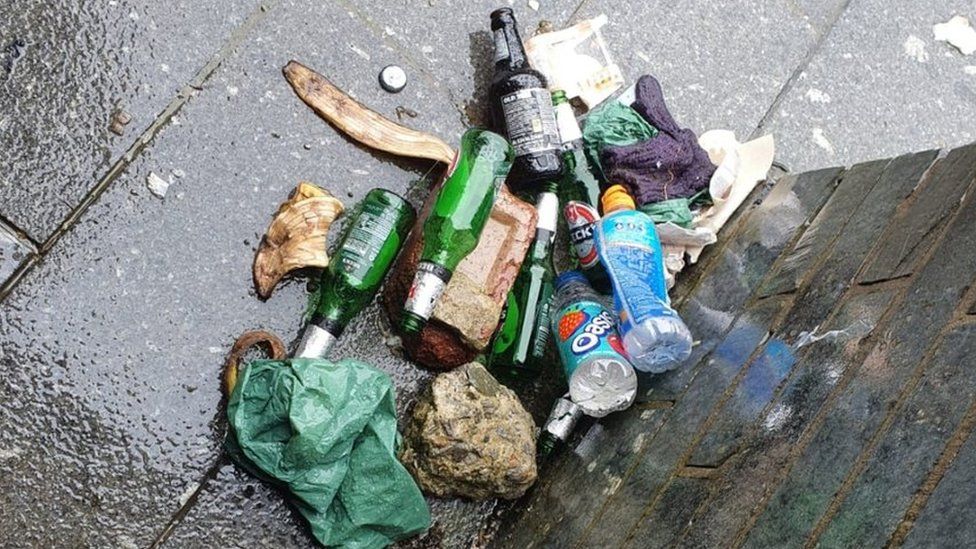Litter: Businesses face clean-up costs for dumped rubbish
- Published

Companies will face clean-up costs if their packaging is littered, under new rules being introduced.
They will also be fined if their rubbish is difficult to recycle or if they miss their recycling targets.
The changes are part of the Welsh government's efforts to reduce waste and come into force from 2024.
Wales is ranked third in the world for domestic recycling and the Welsh government wants all waste either reused or recycled by 2050.
The new "polluter pays" rules, which are being adopted across the UK, would move the cost of dealing with packaging waste away from households and councils to the producers.
Ministers hope this will encourage companies to reduce their use of packaging and use materials which are easier to recycle.
Keep Wales Tidy's Jo Golley said: "This is not designed for the people throwing litter, there are different campaigns for that.
"This is for the producer of the waste, the beginning where the waste starts. We are trying to eradicate those problems."
She said she hoped the result would be to encourage greater responsibility in the packaging used on items such as fast food.
Ms Golley added the details of how it would work in practice were still being looked at.
Frankie Hobro, who runs Anglesey Sea Zoo, said the proposals were "fantastic and well overdue", especially if customers and firms could be encouraged to use reusable products like coffee cups.
"It gives a lot more power to the consumer that wants to do the right thing," said Ms Hobro, who organises beach clean-ups and advises companies on being environmentally friendly.
"There is nothing that changes your mindset and your habits better than having to pick up other people's rubbish," she told Jason Mohammad's phone-in on BBC Radio Wales.
Betina, who runs a Danish bakery in Cardiff, told the phone-in programme that buying recyclable products like cups costs more than non-recyclable packaging.
"From a small business point of view, we're squeezing everything we have got in order to create less waste and be more thoughtful, but it does cost a lot of money."
She said that in her native Denmark refunds were offered on returned bottles and cans.
"I feel that definitely cleaned up a lot of the Danish community for sure because there's money in it," she said.
Wales and Scotland will also penalise businesses responsible for the most commonly-littered items.
The fees collected would be used to improve kerbside rubbish collections.
Dr Christian Dunn, associate pro-vice chancellor for sustainability at Bangor University, said the plans were seen as controversial by those that believe "littering is all about the person that's dropping the litter".
"Let's be really pragmatic about it, people do litter, and they litter for many reasons," he said.
"But one of the reasons is there is no value given to packaging because it's single-use plastic most of the time.
"The people that are producing the packaging, the pollutant, they have to take some responsibility for it throughout the entire lifecycle," he said.
'Costing the taxpayer'
Deputy climate change minister Lee Waters said: "When littered, packaging can wreak havoc on our wildlife and our health.
"It doesn't disappear when you have finished with it, even when disposed of correctly, costing the taxpayer dearly.
"We're proud to be introducing these landmark changes which will lead producers to think about the packaging they are putting on the market and help to incentivise recycling, alongside our fellow governments in the UK.
"We are going further again, by committing to charge producers if their items are commonly littered.
"We will not shy away from the challenges ahead."
Coffee shops employing 10 full-time members of staff will also be required to have dedicated recycling bins for the collection of paper-based disposable cups.
A standard recycling logo will also be required on all packaging to help consumers know what they can put in recycling bins and a deposit return scheme for certain products is also being developed.
- LESSONS FROM LOCKDOWN: How has the experience of lockdown changed us?
- WILD MOUNTAINS OF SNOWDONIA: Five farming families open their gates and share their lives
- Published12 December 2021
- Published15 December 2021
- Published22 May 2021